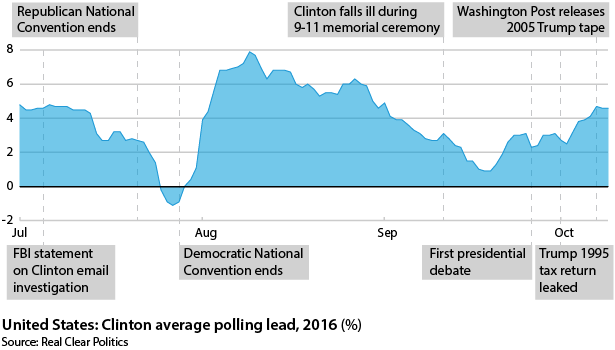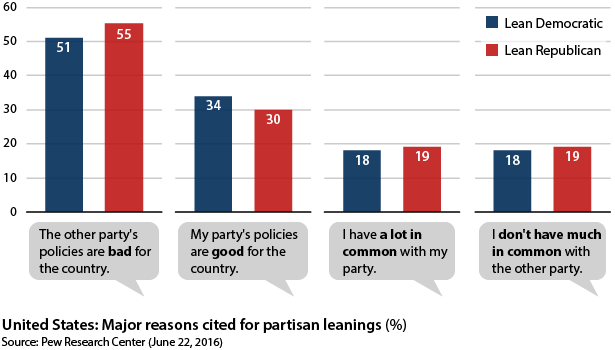Trump is likely to avert collapse, but faces defeat
Trump is still rallying the Republican base against his opponents in the party elite as Election Day looms
Republican presidential candidate Donald Trump and Democratic candidate Hillary Clinton appeared last night in a 'town hall' style debate, marked by personal attacks and Trump's call for Clinton to face prison time. Republican officeholders, party officials and donors have called for Trump to drop out of the presidential race in the last few days. Despite struggling in the polls since the first presidential debate of September 26, Trump has indicated that he will not voluntarily end his candidacy.
What next
With less than a month to November 8, Trump is unlikely to make up lost ground with a small minority of disillusioned Republicans that are potentially vital for him to achieve sufficient voter turnout. More importantly, he is unlikely to sway independents in key states. Beyond the 2016 election and Trump's candidacy, the Republicans will struggle to form a unified policy agenda and political platform.
Subsidiary Impacts
- US policymaking institutions are highly vulnerable to the obstructionist political demands of negative partisanship.
- Republican officeholders treading softly on Trump's candidacy may be worried about conservative charges of enabling a Clinton presidency.
- An unexpected Trump election win via underpolled non-traditional voters would greatly strengthen his hand against the party elite.
- However, voter registration in counties with Trump-leaning demographics does not appear to be outstripping less friendly areas.
Analysis
Trump's debate performance indicates that he intends to fight a negative campaign for the next month.
Republican candidates in down-ballot races have expressed concern that Trump's alienation of key constituencies may cost the party control of the Senate and sub-national governments.
Trump has consistently trailed Clinton in public polling, with only occasional periods of tightening.
The closest the Republican candidate has come since the conventions is in mid-September when Clinton described her opponent's supporters as "deplorables" and her campaign bungled the media management of her falling ill during a September 11 memorial ceremony in New York.
+3.5%
Average Clinton polling lead since first presidential debate
However, Clinton's solid performance in the first debate, Trump's post-debate public statements and controversy surrounding the leak of Trump's 1995 tax return to the New York Times have restored Clinton's polling cushion.
Trump and the Republican Party
Recent scrutiny of the candidate's past statements on women have revived arguments between pro- and anti-Trump factions of the Republican Party from the presidential primaries (see UNITED STATES: Republicans face splits beyond Trump - March 17, 2016):
Electoral
Republican stalwarts critical of Trump worry that his unorthodox candidacy and campaign trail rhetoric will alienate key constituencies for lower-level races and future party outreach, such as college graduates, women, moderate suburbanites, non-white voters and voters under the age of 35 (see UNITED STATES: 'New South' can negate Trump inroads - September 13, 2016).
Ideological
Pro-business and national security Republicans are wary of a Trump presidency because of his deviations from the party's traditional policy positions on foreign policy and free trade.
Personal
The most recent controversy and Trump's personal history rest uneasily with some social conservatives, who have formed a core source of Republican votes since the 1980s.
The selection of Governor Mike Pence of Indiana as Trump's running mate was intended to reassure sceptical party members of the campaign's ability to professionalise, rein in Trump's more controversial rhetoric, and underline the ticket's commitment to conservative policy positions (see UNITED STATES: VP picks illustrate party tensions - August 31, 2016).
Elite defections
With Trump running on an 'anti-establishment platform', the candidate has had an antagonistic relationship with many Republican political consultants, policy professionals, long-standing officeholders, some wealthy donors and former administration officials.
33
Republican members of Congress stating they will not vote for Trump
At present, 17 Republican representatives and 16 senators have stated that they will not vote for Trump. However, Speaker of the House Paul Ryan and Senate Majority Leader Mitch McConnell still endorse Trump -- a sign that the most powerful members of the party are divided about how far they can distance themselves from him.
'Swing state' Republicans
Republican candidates in tight congressional and state-level races, such as Senators Kelly Ayotte of New Hampshire, Mark Kirk of Illinois and Rob Portman of Ohio have stated that they will not vote for Trump, out of concern that alienated Republicans and emboldened Democrats will cost them re-election.
Line crossed?
In contrast to the elite-level defections, a Politico/Morning Consult survey published on October 9 indicated that 12% of polled Republican voters thought Trump should drop out of the race.
Similar to other campaign controversies, interpretations fell strongly along partisan lines, with 70% of Democrats arguing Trump should resign his candidacy and 78% of Republicans stating he should stay in the race.
However, respondents from election-winning constituencies stated Trump should go, including:
- Hispanics (favoured Trump dropping out by 19 percentage points);
- women independents (6 points);
- ideological moderates (4 points); and
- holders of college degrees and higher (2 points).
There are reports that party officials are allegedly looking into invoking Rule 9 of the Republican National Committee, which would allow RNC members to vote in a replacement for a ticket vacancy caused by "death, declination or otherwise".
However, this is only procedurally feasible if Trump departs the race, which has stated he will not. Any party-directed effort to force Trump's ouster in favour of Pence would likely trigger open revolt by Trump's supporters.
Negative partisanship
It is highly likely that Trump will maintain a committed majority of Republican-leaning voters on Election Day, decreasing the chances of a 'Republican collapse' scenario (such as a Clinton 10-point majority or more in the popular vote) at the ballot box.
Negative partisanship will probably prevent a mass anti-Trump revolt by Republican voters, but will not be enough to win him the election
Trump's ability to overcome campaign controversy -- and perhaps Clinton's ability to keep the support of sceptical Democrats -- may largely be due to 'negative partisanship'.
Negative partisanship was the subject of a Pew Research Center study published in June, which indicated that US voters increasingly are motivated to vote for a party out of antipathy towards the opposition as a 'threat to the nation's well-being', rather than positive support of a policy platform or shared values.
Outlook
The phenomenon of negative partisanship has masked the problems within the Republican party during President Barack Obama's tenure in office and is partly responsible for Trump's ascension to the candidacy.
Republican leaders' reliance on negative partisanship for party unity during a Democratic administration delayed necessary debates within the party that would have proven divisive -- exposing cracks between, for example, the business wing which had supported immigration reform, and nativist elements which had opposed it.
A Trump loss would likely plunge the party into vicious internal debate over the necessary 'lessons' of his run -- whether officials advocate greater focus on breadth (wider demographic appeal through moderation) or depth (higher turnout by energising reliable partisans) -- and elected officials will see repeated fights with their base that will blame their 'betrayal' of Trump for his defeat.
Thus, the Republican Party may be consumed with internal divisions on policy and political strategy to such an extent that it 'doubles down' on the appeal to negative partisanship as a unifying force.


-2_350.jpg)